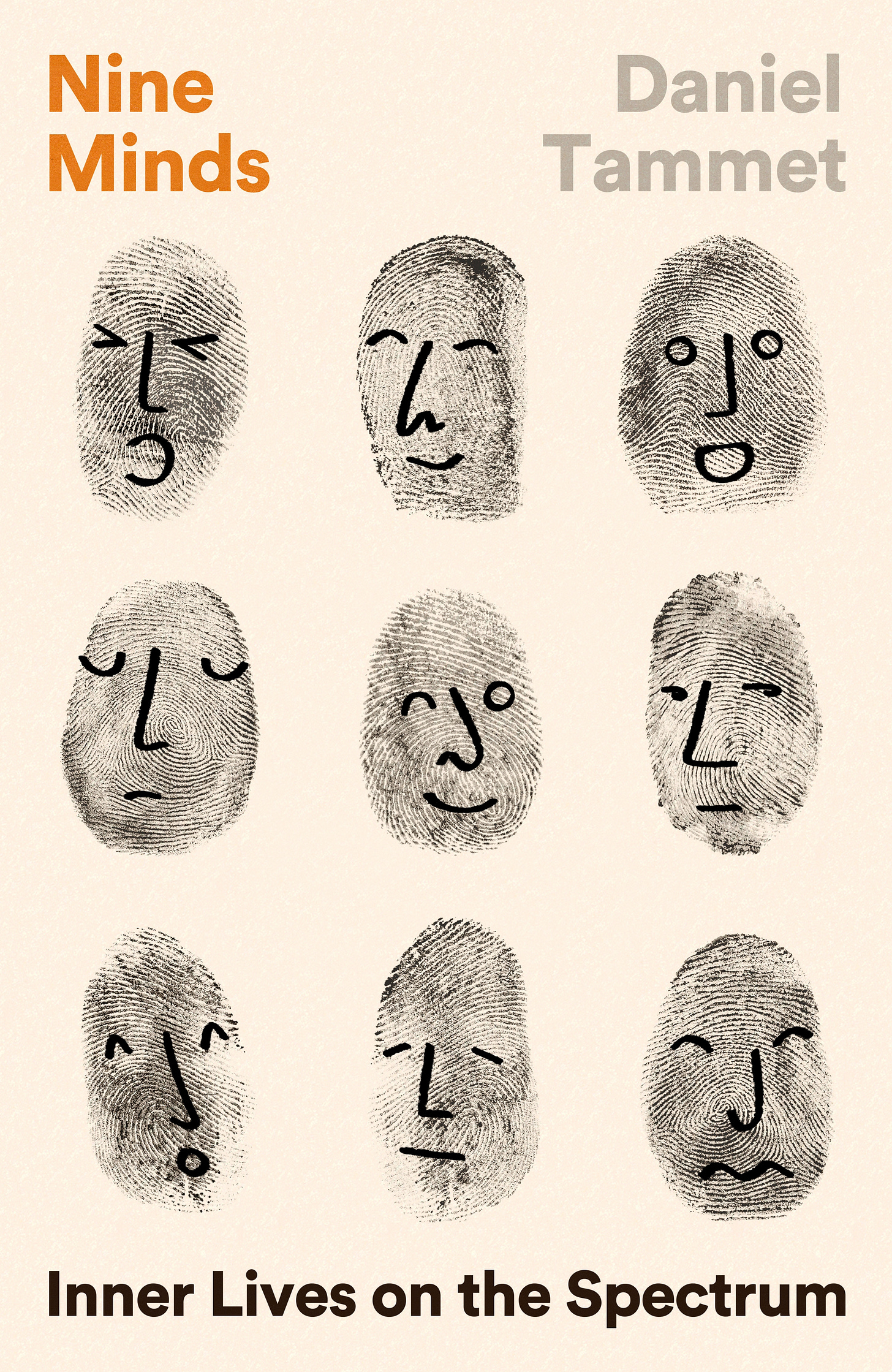July’s True Stories Book Club is on:
Tuesday 23rd July 2024
6pm UK/1pm ET/10am PT
This month’s pick is a wonderful new book by Daniel Tammet in which he profiles nine people with autism. There’s an exclusive excerpt at the end of this post.
Just in case this is your first book club, here’s what you need to know:
Paid subscribers can join us live online for the discussion - a link is at the bottom of the page, after the paywall - and you can send in questions for Daniel by posting them in the comments. If you can’t make it live, we’ll post a recording as soon as possible after the event.
Free subscribers can listen to or watch the recording later.
You don’t have to read the book to take part - but however you use it, hopefully the book club will inspire you to find some brilliant new books and authors!
About Nine Minds: Inner Lives on the Spectrum
About the book
Taking as a subject the lives of nine autistic people from around the world, Daniel Tammet combines hours of interviews with his own intuition to recreate characters (but, as he writes in his introduction, never caricatures) that live on in the imagination long after the final page has been turned.
We meet a surgeon and a politician, a novelist, a psychologist and a Hollywood actor, we are introduced to those who have found new ways to navigate the world without sight, in one instance, or with the use of a computer rather than speech in another. Typically each account is based on his conversations with those he is profiling, but he also uses information gathered from friends and family.
Tammet’s recreations are deft and thoughtful, illuminating and warm. The people he profiles show that there are infinite ways to live an authentic life. As he writes:
“Evading […] limiting clichés, defying outdated prejudices, the nine minds that I portray testify each in their own way to the singular power and beauty of the autistic imagination, and to the daring freedom with which they invent their lives.”
Nine Minds is published on 11 July, and there’s a nice, long excerpt below.
Order Nine Minds on Kindle in the US
Essential links:
Read a new interview with Daniel in The Daily Telegraph
Watch Daniel’s 2011 TED Talk on Different ways of knowing
Daniel’s website
About Daniel Tammet
Daniel Tammet is the subject of the award-winning television documentary The Boy with the Incredible Brain, as well as a BBC Radio 4 documentary, Two Poets (with Les Murray), and the Kate Bush song Pi. He is the author of nine books, including the memoir Born on a Blue Day. His writing has appeared in Esquire, The Times Literary Supplement, The Guardian, Aeon and Quadrant, and his books have been translated into 30 languages. He was elected a Fellow of the Royal Society of Arts in 2012, and awarded an honorary doctorate from his alma mater, the Open University, in 2023.
Here’s an extract from Nine Minds.
WARREN
In his previous life Warren had fixed cars. His father was in the motor trade and had apprenticed him at sixteen, thinking, the lad had never gotten along with school. The suburbs of Hall Green in the seventies wasn’t the easiest place for the odd and shy to stick out – even someone like Warren, who had a good head on his shoulders. He hated the playing fields – footie and the like – hated being jostled. Whistles, claps and pops rumpled his brow and hurt his ears. He puzzled over the conversations he heard, the turns of phrase, the words that might mean one thing or something else altogether. What was that about? His puzzlement got the better of him and he steered clear of his classmates’ games and maintained a cautious distance. He always had the feeling someone was trying to have him over.
The worst of it were the bullying fists and the insults he always took without a fight. He warded them off with his absence; teachers counted his distress in days off sick. Moving comprehensives didn’t help, only growing up did.
When Warren joined the police at the end of his twenties, keen to work more with his mind, he brought to it, besides a desire to catch the adult world’s bullies, his long experience of cars. Solving injustices was something like repairing cars. A small voice on the phone would report an offence and it’d be like being back at the garage in Digbeth, someone trailing in a Morris Minor that wouldn’t start or a misfiring Ford Escort and nothing else for it but to flip the bonnet and get stuck into the engine, get his hands mucky, track the source of the trouble methodically to some broken part or dingy corner.
The mechanics of a crime, of a murder, were something you could take apart and reconstruct, if you knew how.
‘Trilby’s on the case,’ the policemen said to one another, alluding to the brown hat worn by Warren indoors and out, in all weathers. It was a rare day when you saw the detective without his trilby. The snug, narrow-brimmed hat shielded his senses from all manner of glints and creaks and hums: it helped him to think.
✲
I’d imagined him for years before I met the detective. Quite unawares, I’d been in search of him for the story I vaguely hoped one day to write: a story of murderous mystery solved by a neurodivergent policeman. I trusted such a person really did exist.
Like many autistic boys – like young Warren, too, as I would learn – following the adventures of one particular famous detective consumed a fair bit of my adolescence. Sherlock Holmes appeared in a variety of forms: in the much-borrowed library books, as well as their adaptation for TV – films and episodes broadcast on lazy weekends and endlessly replayed. I remember the audacious chases, and the smoggy cobbled streets and Jeremy Brett frowning through a magnifying glass as he reasoned his way to the right suspect.
Warren had the pipe and the headwear but he wasn’t acting a part, nor was he the figment of any author’s creation. He had been in the force for over twenty years when I learned of him. He had made public appeals in connection with his cases, and more recently given an interview in the regional press. It had appeared in the Birmingham Mail. The headline said, ‘Meet the autistic Birmingham murder detective: “I see things differently to everyone else.”’
At the time of his interview Warren had not long received his diagnosis, and when I got in touch with him, in mid-2021, it was something he was still working through. He had a hard time answering some of my questions; they awakened memories that could be painful. He was far more used to doing the asking than the answering.
He was self-effacing, preferring to concentrate our exchanges on the victims of homicides he’d helped to solve (and whose every name he could still recall), but he spoke as well about his childhood and his family, about how he got into policing, about the ways in which he and his colleagues thought very differently.
‘Sometimes they’ll tell themselves a story,’ he said. ‘They don’t mean to, but they’ll convince themselves that the person they think is guilty really is. Because this suspect was in the vicinity of the crime at the hour in question and has form but no alibi.’
Colleagues would fall in with each other’s certainty, Warren said. ‘Everything seems to fit, everything points to so-and-so. Some can get pretty wound up if you can’t see how everything points to so-and-so. The CCTV. So-and-so is all over it. Take a look for yourself.’
So Warren would take a look, but something would niggle at him. A problem of logic. The guy takes the scenic route from a crime scene, in the full glare of CCTV? He’s much street-wiser than that. And sure enough, after some further inquiries, so-and-so would prove not to be their man.
‘I suppose I don’t jump to conclusions. I inch towards them. I’m wary of obvious. Obvious isn’t always right.’
We discussed murder in fiction – what TV and novels got right and wrong about it. I was thinking of the story – Warren’s story – I intended to write. I didn’t want to make the mistakes he could at least warn me of.
‘Behind every detective there’s a whole team knocking on doors, chasing up possible leads. Boring leg work, but it’s essential. Without it the detective is nothing. Other than helping with that I’d spend a lot of my time at a desk, mulling a case. Think a middle-aged bloke on his own in his office. Think silence. Not much of the racing about and shouting and other carrying-on you see on the box or read in some books.’
I asked him to describe his most fiendish case and he did so, though there was a limit to how much he could say. For the rest, there were old press articles and other sources of information if I knew where to look.
The Bains case.
The Man in the Lake.
Take care,
Katherine
If you think a friend or loved one would enjoy The Clearing by Katherine May, gift subscriptions are available here | Website | Buy: Enchantment UK /US | Buy: Wintering UK / US | Buy: The Electricity of Every Living Thing UK / US
This newsletter may contain affiliate links.







Very much looking forward to this!
Am so excited for this!